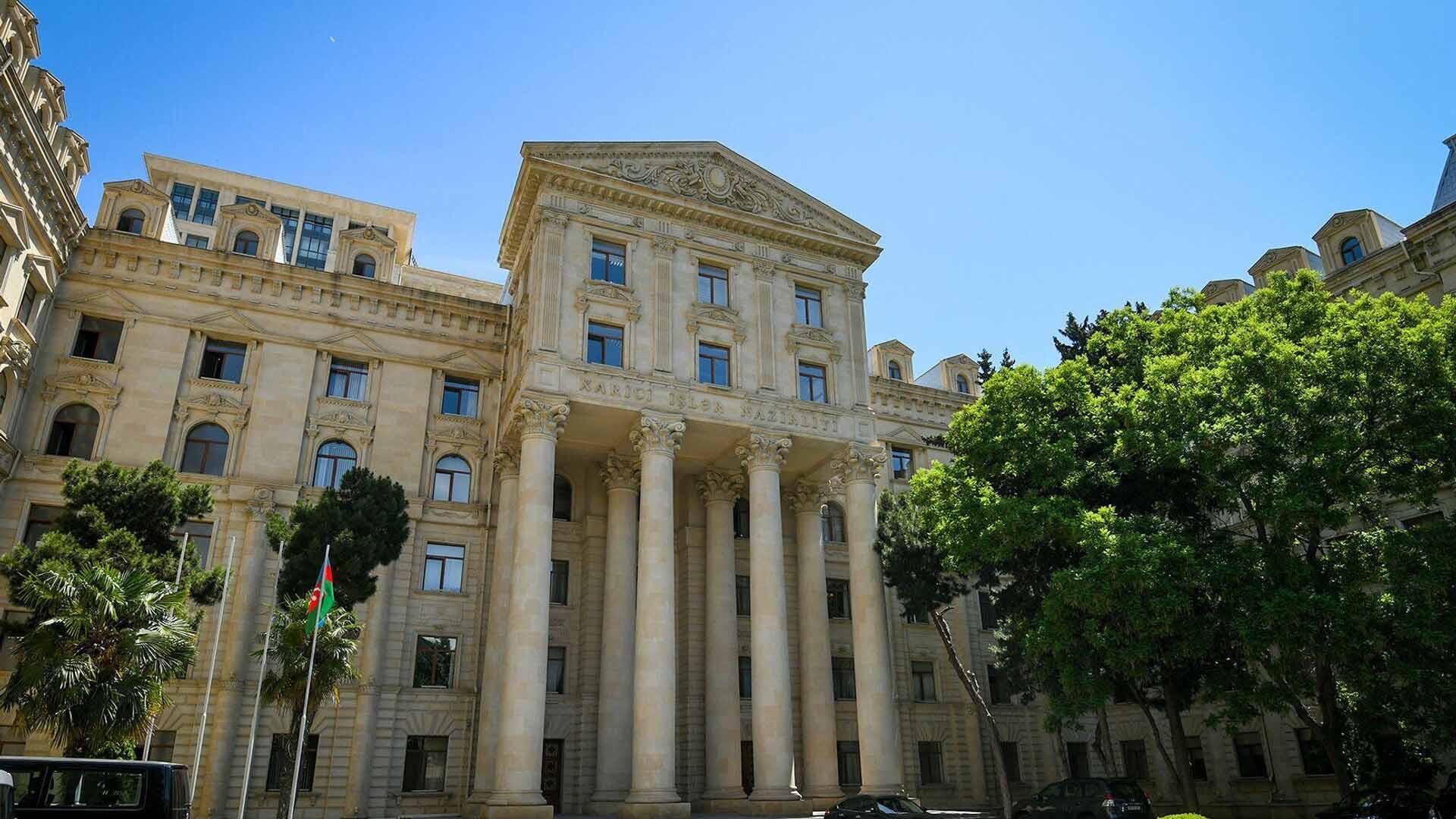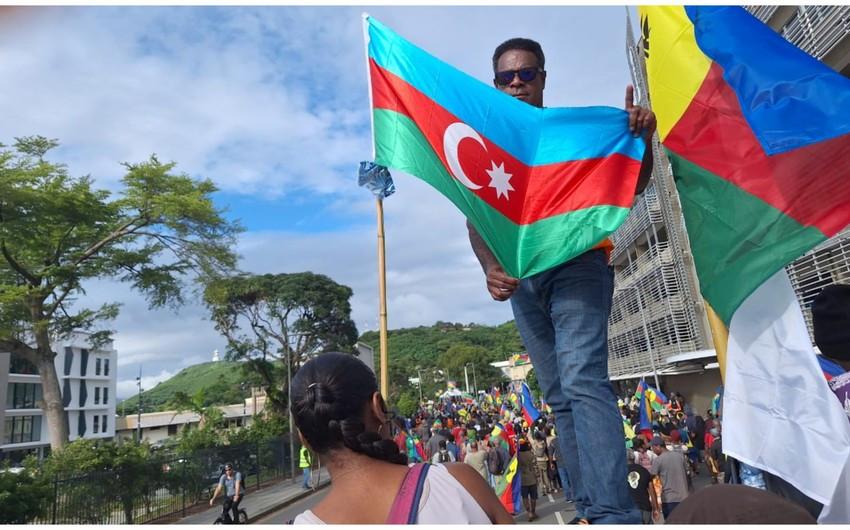Paris & Baku trade barbs amid escalating tensions Geopolitical showdown
Paris and Baku have again traded barbs, accusing each other of interfering in each other’s domestic affairs. This round of accusations, fuelled by the French interior minister’s remarks, reflects escalating tensions as both sides accuse each other of meddling in national issues. Paris has rebuked Baku, alleging interference in internal matters and backing New Caledonia, while Baku has fired back, accusing Paris of similar actions and siding with Armenia.
This tit-for-tat rhetoric underscores deeper geopolitical strains, with each side vying to assert its sovereignty and diplomatic independence. The dispute highlights the complexity of international relations, where perceived infringements on sovereignty can quickly escalate into diplomatic confrontations. The accusations primarily revolve around France's stance on Armenia-Azerbaijan relations and its implications for France's colonial past and current issues with New Caledonia.
Reasons behind the latest spat & Baku’s response
Azerbaijan on April 30 rejected claims by French Interior Minister Gerald Darmanin regarding Baku “supporting separatism” in New Caledonia, a French overseas territory in the Pacific that has seen deep divisions between its indigenous Kanak population and Europeans.
We resolutely reject the groundless and accusatory claims made against Azerbaijan by French Interior Minister Gérard Darmanin, while talking about Azerbaijan-New Caledonia relations in the law committee of the French National Assembly on 29 April 2024, Azerbaijani Foreign Ministry Spokesperson Aykhan Hajizada said in a comment.
“Accusing Azerbaijan of allegedly supporting separatism about New Caledonia, the French interior minister forgets that it was France that took steps to support aggressive separatism in Azerbaijan for a long time and regularly received representatives of the so-called separatist regime in France at a high level.

“We know that the French Parliament, at the initiative of the French ruling party, adopted decisions and resolutions that questioned and harmed the territorial integrity and sovereignty of Azerbaijan, recognized the separatist regime as well as enabled the activity of a friendship group with the former so-called separatist regime. Instead of trying to smear Azerbaijan with ridiculous and cheap accusations, such as the massacre of the Armenian population, the French interior minister should not forget that as part of its colonial policy implemented for many years and continued now, his country has committed crimes against humanity for local peoples and brutally murdered millions of innocent people.
“Against the backdrop of all the above mentioned, it is completely unacceptable for a French government official without fitting into any ethical framework in terms of international interstate relations to deliberately use insulting expressions about the constitutional state structure of Azerbaijan. We once again call on France not to interfere in Azerbaijan’s internal affairs and to stop making baseless claims against our country. Once more, we declare that our country will continue to take all necessary measures to protect its national interests,” Hajizada added.
France's geopolitical missteps
France's attempts to influence affairs in the South Caucasus, particularly by siding with Armenia, have backfired, exposing significant miscalculations in French political circles. Azerbaijan's steadfast control over the region has left Paris marginalized and inefficient, symbolized by President Emmanuel Macron's reliance on the EU's civilian spy mission in Armenia for regional insights. The decision to align with Armenia as a regional ally has not only been unsuccessful but has also alienated France from the South Caucasus, leaving "doors closed" to Paris’ diplomacy.
Azerbaijan has almost emerged as the dominant geopolitical leader in the South Caucasus, controlling the region and rejecting Paris' attempts to establish a foothold. Macron's reliance on external sources, like the EU's civilian spy group in Armenia, highlights France's diminishing influence.
The recall and swift return of the French ambassador to Azerbaijan, Anne Bouillon, is another sign of Macron's failed attempts to exert pressure on official Baku and seems also backfired. The ambassador’s immediate return underscores Azerbaijan's firm stance and limited tolerance for French interference.
President Macron's strategies to flex muscles against Azerbaijan, including recalling the ambassador, have not shown results and risk further damaging France's international standing. Paris's alignment with Armenia as a regional ally has proven detrimental since Baku's rejection of French interference reflects the shifting power dynamics in the South Caucasus soon after the 2020 Second Karabakh War, where Azerbaijan emerged as the dominant geopolitical force.
Official Baku has communicated to the Elysee Palace that constructive engagement, rather than pro-Armenian bias, is crucial for establishing and maintaining normal relations. The emphasis is on mutual respect for territorial integrity and sovereignty.

This diplomatic message underscores Azerbaijan's stance on the importance of respectful dialogue and cooperative engagement in international relations. By highlighting the significance of respecting territorial integrity and sovereignty, official Baku seeks to promote understanding and constructive interaction with France and those aligning with it.
The communication emphasizes that prioritizing constructive engagement over biased approaches towards Armenia is essential for fostering positive and productive bilateral relations. Azerbaijan's commitment to upholding principles of mutual respect and sovereignty reflects its diplomatic priorities and aspirations for stable, respectful relationships on the international stage.
In conveying this message, official Baku aims to encourage meaningful dialogue and cooperation between the two nations based on principles of equality, respect, and adherence to international norms. This approach is intended to pave the way for improved relations that benefit both countries and contribute to regional stability and cooperation.
The future direction of Azerbaijan-France relations hinges on constructive dialogue with official Baku. France's continued pro-Armenian stance undermines its interests in the South Caucasus and limits its diplomatic maneuverability.
New Caledonia and colonial legacies
The comparison drawn by French Interior Minister Gérald Darmanin between New Caledonia and Armenia-Azerbaijan is contentious. Azerbaijan's support for Caledonians seeking independence aligns with international norms, contrasting France's historical colonial policies.

Azerbaijan's Foreign Ministry has strongly rejected Minister Darmanin's allegations, citing France's past support for separatism in Azerbaijan and colonial crimes against humanity. Azerbaijan asserts its right to defend Caledonians against colonial rule as a matter of international concern.
Baku has also unequivocally rejected French Minister Darmanin's allegations, emphasizing France's historical support for separatism in Azerbaijan, and urging it to refrain from baseless accusations and interference in internal affairs.
Conclusion
The rift between France and Azerbaijan highlights broader geopolitical shifts and historical grievances. France's colonial legacy intersects with contemporary diplomatic challenges, underscoring the complexities of global power dynamics and the imperative for nuanced, respectful engagement in international relations.
France's inability to influence Azerbaijan underscores broader challenges to its international prestige and diplomatic efficacy. The return of the French ambassador to Baku signals a retreat from confrontational tactics but also reflects France's frustration and impotence in the face of Azerbaijan's resolve.
Official Paris must reassess its approach and engage in meaningful discussions with Azerbaijan, moving away from pro-Armenian biases. Recognizing the rights of Caledonians to self-determination aligns with international law and may help restore France's credibility and influence.
France's diplomatic confrontation with Azerbaijan exposes deeper geopolitical shifts and historical grievances. France's colonial legacy intersects with contemporary diplomatic challenges, highlighting the complexities of international relations and the need for nuanced, respectful engagement. Moving forward, France must recalibrate its strategy to navigate the evolving geopolitical landscape effectively.








